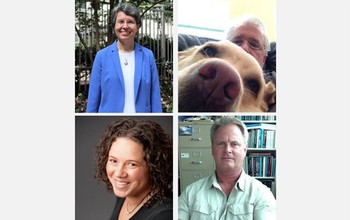EAR Annouces Staff Changes, Winter 2018

EAR Staff Changes -- Top: Lina Patino, Steve Harlan. Bottom: Holly Barnard, Kevin Johnson.
January 30, 2018
-----------------------------------------------------------------------------
Message from the Departing Division Director
By the time you read this message, I’ll have completed more than three years’ rotation at NSF in the role of EAR division director and returned to my home university. My NSF experience only confirmed for me what we all know: the merit review of proposals at NSF sets the gold standard for fair and thoughtful selection of awards. Moreover, I can assure you that EAR program directors have the Earth Science community’s best interests at heart. In workshops they urge everyone to "call your program officer,” and they mean it. Their job is to advise and to help all of us succeed.
As community members we can help in three ways. First, our service as ad hoc reviewers and panelists is essential to the merit review system. Second, as researchers we create the knowledge that advances the frontiers of our science and serves society. When we communicate those advances we help the nation understand the value of NSF’s investments. Thank you for continuing to share press releases from your science and news of your students with your program officers and with ear-communication@nsf.gov. And third, please consider a rotation at NSF. It is both personally rewarding and helps keep the agency vibrant and forward-looking. Openings occur regularly, so please let your program officer know if you are interested.
As you’ll read below, Lina Patino is ably leading the division during the recruitment of a new division director. Greg Anderson continues in his role as section head for integrated activities and Dr. Steve Harlan is acting section head for disciplinary programs. I know first-hand that the division is in excellent hands!
Warmly,
Carol Frost
-----------------------------------------------------------------------------
Staff changes…
Lina Patino, the newly appointed acting division director, has been an NSF program director since 2005 and previously served as acting section head (2010-12). She managed the Education and Workforce Development portfolio; served as a detail in the Office of International Science and Engineering; and served on the Directorate for Geosciences Education Working Group.
Stephen Harlan, the newly appointed section head for disciplinary programs, was a rotator in the Tectonics program from 2003-2006. He returned to NSF in 2008 as a section-wide program director in the Deep Earth Processes section of EAR; in 2010, he rejoined the Tectonics Program. Prior to his service at NSF, he had appointments with the U.S. Geological Survey and was a professor at George Mason University in Fairfax, Virginia.
Welcome…
Holly Barnard, program director for Hydrologic Sciences, joins EAR from the Institute of Arctic and Alpine Research and the Dept. of Geography at the Univ. of Colorado - Boulder. Her research investigates how vegetation processes affect water flow dynamics and pathways in soil and streams, and conversely, how water flow paths affect vegetation function in mountainous terrain. She serves as an associate editor for Water Resources Research and on the Catchment Hydrology Technical Committee for the American Geophysical Union.
Kevin Johnson, a program director for the Instrumentation and Facilities Program, comes from the Department of Geology and Geophysics at the University of Hawaii at Manoa. He received his PhD in Geology and Oceanography from M.I.T. and Woods Hole Oceanographic Institution in 1990. Kevin serves as a Secretary-General of the Pacific Science Association and as an external member of the JOIDES Resolution Geology Laboratory Working Group with IODP. His research interests are volcanology, mantle composition and melt generation, seafloor volcanic petrology and geochemistry, and carbonation of mafic and ultramafic rocks.
Thanks to…
Carol Frost has returned to the University of Wyoming after 3 years as division director. Una Alford, who provided support in the Division as program specialist, has been promoted to program analyst in the Office of Integrated Activities at NSF. We congratulate Una!
Subscribe directly by sending a blank email to earth-subscribe-request@listserv.nsf.gov. Unsubscribe by sending an email to earth-unsubscribe-request@listserv.nsf.gov.
The U.S. National Science Foundation propels the nation forward by advancing fundamental research in all fields of science and engineering. NSF supports research and people by providing facilities, instruments and funding to support their ingenuity and sustain the U.S. as a global leader in research and innovation. With a fiscal year 2023 budget of $9.5 billion, NSF funds reach all 50 states through grants to nearly 2,000 colleges, universities and institutions. Each year, NSF receives more than 40,000 competitive proposals and makes about 11,000 new awards. Those awards include support for cooperative research with industry, Arctic and Antarctic research and operations, and U.S. participation in international scientific efforts.
Connect with us online
NSF website: nsf.gov
NSF News: nsf.gov/news
For News Media: nsf.gov/news/newsroom
Statistics: nsf.gov/statistics/
Awards database: nsf.gov/awardsearch/
Follow us on social
Twitter: twitter.com/NSF
Facebook: facebook.com/US.NSF
Instagram: instagram.com/nsfgov

